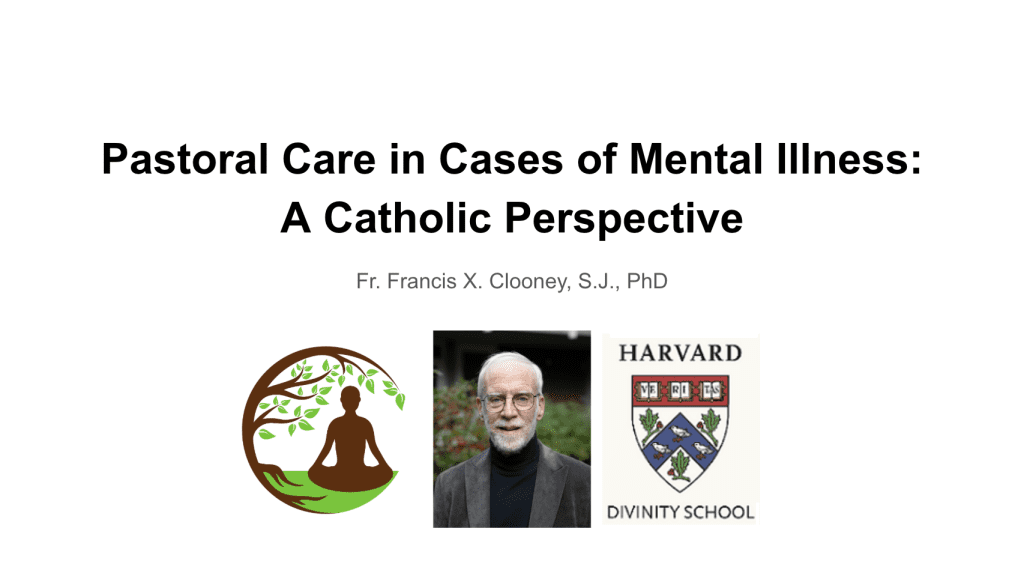Introduction
Let’s talk about mental health and Catholic pastoral care. Living with mental health challenges often leads us to important questions. These include questions related to purpose, hope, and how we fit into our communities. In the Catholic Church, these questions are met with a unique blend of care and faith. Catholic pastoral care offers not just spiritual support, but also practical help to those who are struggling.
Recently, BP Harmony founder Imran Ghani sat down for a heartfelt conversation with Father Francis Clooney, a Catholic priest and Harvard professor. Together, they explored how the Catholic tradition approaches suffering, why community matters so much, and how saints provide comfort to people facing mental health struggles.
Imran asked Father Clooney three big questions about mental health and Catholic pastoral care:
- How is suffering understood in light of the Bible’s teachings, especially when it relates to mental illness?
- How can Catholic communities better support individuals with mental illnesses in a way that reflects Christ’s love?
- Are there saints or figures within Catholic tradition who exemplify how to embrace mental health struggles?
The journey through mental illness is often marked by profound questions, not just of health but of meaning, hope, and resilience. Within the Catholic tradition, the intersection of suffering, faith, and pastoral care offers a deeply rooted perspective that can guide individuals navigating these challenges. Father Francis Clooney, a Catholic priest and scholar of Comparative Theology at Harvard University, reflects on the role of suffering in the Catholic worldview, the importance of community in embodying Christ’s love, and the example of saints who found holiness amidst mental health struggles.
For more guidance on mental health, check out our book and masterclass to reclaim control of your life. You can also check out our free resources.
Understanding Suffering Through the Bible
The Bible doesn’t ignore pain; instead, it faces suffering honestly, from Adam and Eve’s exile to the hardships of Job and even Christ’s crucifixion. Father Clooney points out that the Bible tells us pain is part of being human, but it never says suffering takes away a person’s value. Job’s story, for example, teaches us that even when we can’t understand why we’re suffering, we can still trust in God’s care. This message is so important for anyone struggling with mental health—it reminds us that God’s love is bigger than our pain.
Fostering Christ’s Love in Catholic Communities
Mental illness can make us feel alone, but Catholic pastoral care reminds us that we belong. Jesus reached out to people who were isolated—he not only healed them, but also brought them back into their communities. Father Clooney believes Catholic parishes should mirror this, working to include everyone, especially those facing mental health difficulties. He talks about the importance of the Eucharist and other sacraments in offering healing and welcome to all.
Many parishes now have groups, counseling, and outreach programs focused on mental health. But sometimes, what helps most is just a kind word, a listening ear, or an invitation to share a meal. These small acts show Christ’s love in a real way and help break the stigma around mental illness.
Saints as Models of Resilience and Holiness
The Church holds up saints who faced their own sufferings, including mental health struggles. Saints like St. Dymphna (patron of mental illness), St. Benedict Joseph Labre, St. Therese of Lisieux, and St. John of God show us that holiness and hope are possible, even in hard times. Their stories remind us that suffering can deepen our faith and help us connect with others in need.
- St. Dymphna: She is known as the patron saint of mental illness. St. Dymphna’s story is one of enduring love amidst suffering. When her father’s mental instability led to tragic consequences, her unwavering faith and compassion became a beacon for those facing similar trials.
- St. Benedict Joseph Labre: He was labeled by some as “dysfunctional” due to his erratic behavior. St. Benedict was repeatedly turned away from monasteries. Despite this, his deep spirituality shone through. He is now remembered as a saint who found God amidst personal turmoil.
- St. Therese of Lisieux: She is often called the “Little Flower”. St. Therese experienced profound sensitivity and depression, particularly as she faced the physical decline brought on by tuberculosis. Yet, her “Little Way”—finding God in small, everyday acts—offers a path to holiness for those battling inner struggles.
- St. John of God: He lived on the streets and battled personal demons. St. John of God’s compassion for the marginalized transformed him into a model of Christ-like love. His legacy underscores that mental illness does not preclude one from a life of profound service and sanctity.
These saints remind us that suffering, while deeply challenging, can also be transformative. It can deepen empathy, strengthen faith, and inspire acts of love that ripple outward into the world.
Mental Health and Catholic Pastoral Care | A Call to Action and Hope
Father Clooney and Imran’s conversation is a reminder that mental health and Catholic pastoral care go hand in hand. The Church sees each person as worthy of love and support, no matter what they’re facing. By offering acceptance, kindness, and faith, Catholic communities can be places where all are welcome and no one struggles alone.



